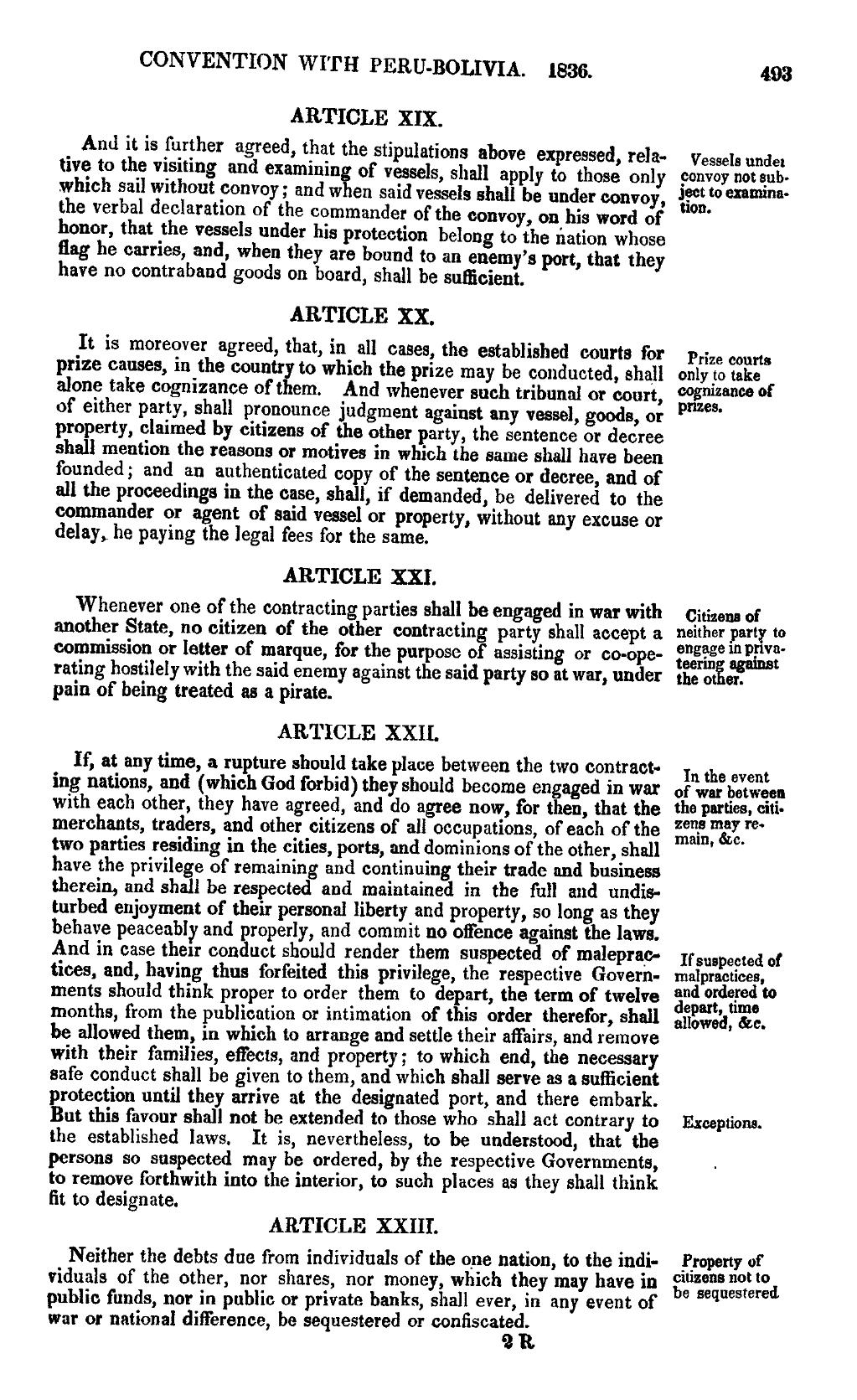CONVENTION WITH PERU-BOLIVIA. 1836. 493 ARTICLE XIX. I And it is further agreed, that the stipulations above expressed, rela- Vessels undo; tive to the visiting and examining of vessels, shall apply to those only gonvoy not subwhich sail without convoy; and when said vessels shall be under convoy, ·l?°“°°"°”‘i"“‘ the verbal declaration of the commander of the convoy, on his word of mm honor, that the ve sels under his protection belong to the nation whose flag he carries, and, when they are bound to an enemy’s port, that they have no contraband goods on board, shall be sufficient. ARTICLE XX. It is moreover agreed, that, in all cases, the established courts for p,;,, wm, prize causes, in the country to which the prize may be conducted, shall only to take alone take cognizance of them. And whenever such tribunal or court, °°¥“'“”°° °f of either party, shall pronounce judgment against any vessel, goods, or {mm' property, claimed by citizens of the other party, the sentence or decree shall mention the reasons or motives in which the same shall have been founded; and an authenticated copy of the sentence or decree, and of all the proceedings in the case, shall, if demanded, be delivered to the commander or agent of said vessel or property, without any excuse or delay, he paying the legal fees for the same. ARTICLE XXI. Whenever one of the contracting parties shall be engaged in war with cmzsm or another State, no citizen of the other contracting party shall accept a ¤¤ith¢¤‘ Pm? *0 commission or letter of marque, for the purpose of assisting or co-ope- f:f,,?§° rating hostilely with the said enemy against the said party so at war, under me Otis]-, pain of being treated as a pirate. ARTICLE XXII. It, at any time, a rupture should take place between the two contract- In the mm, ing nations, and (which God forbid) they should become engaged in war of wu between with each other, they have agreed, and do agree now, for then, that the the P¤¤'¤i<>¤· dilmerchants, traders, and other citizens of all occupations, of each of the gg51m5i;"' two parties residing in the cities, ports, and dominions of the other, shall` have the privilege of remaining and continuing their trade and business therein, and shall be respected and maintained in the full and undisturbed enjoyment of their personal liberty and property, so long as they behave peaceably and properly, and commit no offence against the laws. And in case their conduct should render them suspected of maleprac- I;,,,,,,,,,,,,; of tices, and, having thus forfeited this privilege, the respective Govern- rnalpractices, ments should think proper to order them to depart, the term of twelve Szdggdifgtw months, from the publication or intimation of this order therefor, shall aug,,,,};, &,,_ be allowed them, in which to arrange and settle their atfairs, and remove with their families, effects, and property; to which end, the necessary safe conduct shall be given to them, and which shall serve as a sufficient protection until they arrive at the designated port, and there embark. But this favour shall not be extended to those who shall act contrary to Exceptions. the established laws. It is, nevertheless, to be understood, that the persons so suspected may be ordered, by the respective Governments, . to remove forthwith into the interior, to such places as they shall think tit to designate. ARTICLE XXIII. Neither the debts due from individuals of the one nation, to the indi- rropeny of viduals of the other, nor shares, nor money, which they may have in §“’”°““ "°°'° . . . . . e sequestered public funds, nor in public or private banks, shall ever, in any event of war or national difference, be sequestered or coniiscatgdk
Page:United States Statutes at Large Volume 8.djvu/505
This page needs to be proofread.
